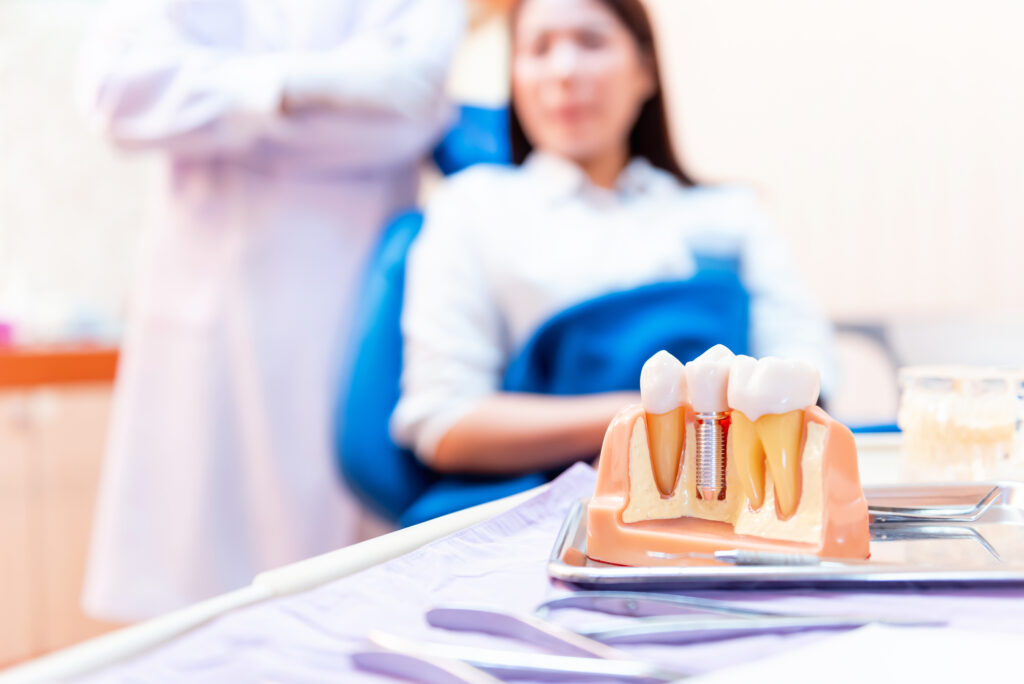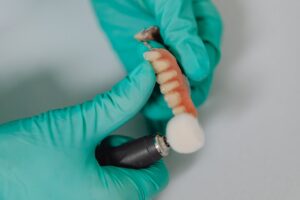
Dentist with tooth implant false teeth. Dentistry and healthcare concept at dental clinic.
Congratulations on taking the first step towards a healthier smile with a dental implant! While the procedure may have been a little daunting, the road to recovery doesn’t have to be. With the right care and attention, you’ll be back to smiling and chewing comfortably in no time. In this post, we’ll discuss some tips for recovering well after a dental implant so that you can heal quickly and effectively.
Follow Your Post-Op Instructions
Your dentist will provide you with specific instructions to follow after your dental implant surgery. It’s crucial to adhere to these guidelines to ensure proper healing and reduce the risk of complications. This may include taking prescribed medications, avoiding certain foods, and practicing good oral hygiene. By following these instructions diligently, you’ll give your implant the best chance to integrate successfully with your jawbone.
If you fail to follow your post-op instructions, it could lead to complications and delay your recovery. For example, not taking prescribed medications as directed could result in infection or prolonged pain and discomfort. Ignoring food restrictions could also cause damage to the implant site and hinder healing. Poor oral hygiene practices may increase the risk of infection or even cause implant failure. Therefore, it’s essential to follow your post-op instructions carefully to ensure a swift and seamless recovery.
Manage Pain and Swelling
It’s normal to experience some pain and swelling after a dental implant procedure. To manage these symptoms, your dentist may prescribe pain medication or recommend over-the-counter options. Applying an ice pack to the affected area can also help reduce swelling. Remember to rest and avoid strenuous activities in the days following surgery to allow your body to heal properly.
Certain things can aggravate swelling and should be avoided during the recovery period. These include smoking, drinking alcohol, consuming hot foods or liquids, and vigorous rinsing or spitting. Smoking can constrict blood vessels and slow down healing, while alcohol can interfere with medication effectiveness and cause dehydration. Hot food and drinks can increase blood flow to the implant site, leading to more swelling. Vigorous rinsing or spitting can disrupt the blood clot at the implant site and prolong healing time. By avoiding these activities, you’ll help reduce swelling and promote proper healing.
Maintain Good Oral Hygiene
Keeping your mouth clean is essential for preventing infection and promoting healing after a dental implant. Your dentist may recommend using a special mouthwash or gentle saltwater rinse to keep your mouth clean. Be gentle when brushing around the implant site to avoid irritation. It’s important to continue practicing good oral hygiene habits even after the initial healing period to ensure the long-term success of your dental implant.
Eat a Soft Diet
In the days following your dental implant surgery, it’s best to stick to a soft diet to avoid putting too much pressure on the implant site. Opt for foods that are easy to chew and swallow, such as soups, yogurt, smoothies, and mashed potatoes. Avoid hot, spicy, or crunchy foods that could irritate the surgical site. As you heal, gradually introduce more solid foods back into your diet, following your dentist’s recommendations.
After a dental implant surgery, be sure to be cautious when eating out at restaurants. Stick to soft, easy-to-chew options and avoid hot or spicy dishes that could cause discomfort or irritation to the implant site. It’s also essential to inform your server and ask for modifications if needed, such as requesting sauces or garnishes on the side. Avoid using straws and be mindful of how you chew your food to prevent any damage or irritation to the implant site. By being careful and selective about your food choices when eating out, you’ll help facilitate a smooth recovery process.
Schedule Follow-Up Appointments
Regular follow-up appointments with your dentist are crucial for monitoring the healing process and ensuring the success of your Dental Implant Solutions. Your dentist will check on the implant site, remove any sutures if necessary, and address any concerns or issues you may have. Don’t hesitate to contact your dentist if you experience persistent pain, swelling, or other symptoms that concern you.
In rare cases, complications may arise during the recovery period that require immediate attention. If you experience severe pain, excessive bleeding, or signs of infection like fever and swelling, it’s important to contact your dentist immediately. They may schedule an emergency appointment to address the issue and prevent further complications. It’s crucial not to ignore any concerning symptoms and seek prompt dental care for the best chance of successful recovery. Your dentist is there to support you throughout the entire process, so don’t hesitate to reach out if you have any concerns.
Recovering well after a dental implant requires patience, diligence, and good self-care. By following your dentist’s instructions, managing pain and swelling, maintaining good oral hygiene, eating a soft diet, and scheduling follow-up appointments, you’ll be well on your way to a successful recovery. Remember to take it easy, listen to your body, and reach out to your dentist if you have any questions or concerns. With proper care and attention, you’ll be enjoying your new smile in no time. Wishing you a speedy and smooth recovery!


